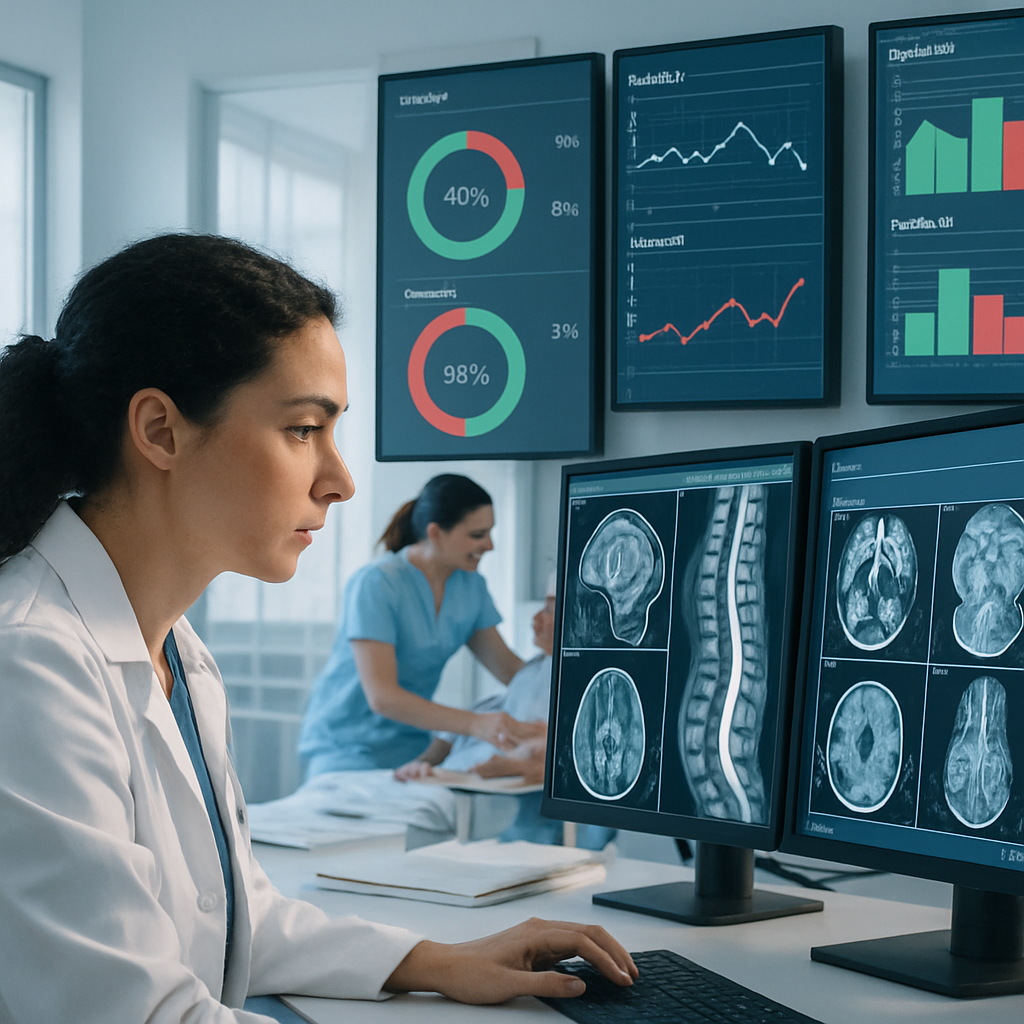Enabling AI-Powered Imaging at Scale
Every 3 seconds, a new medical imaging scan is performed somewhere in the world, collectively generating over 2 billion examinations annually. This staggering volume of healthcare data is overwhelming traditional diagnostic systems, with radiologists now expected to interpret one image every 3-4 seconds in a standard workday.
Against this backdrop of increasing pressure, artificial intelligence has emerged not merely as an auxiliary tool but as a transformative force in medical imaging, one that’s redefining what is possible in patient care. According to recent data from the EuroAIM Survey, nearly half of all radiologists (48 percent) have already integrated AI tools into their diagnostic workflows, signaling one of the most rapid technological adoptions in healthcare history.
This revolution isn’t just changing how images are processed; it’s fundamentally altering diagnostic accuracy, with AI-assisted diagnoses demonstrating error reduction rates. As healthcare facilities generate unprecedented volumes of imaging data daily, the question is no longer whether AI will transform medical imaging, but how quickly healthcare providers can adapt to this new paradigm that promises both enhanced diagnostic capabilities and improved patient outcomes.
The Growing Need for AI in Medical Imaging
Modern healthcare facilities face a dual challenge: processing an increasing number of high-resolution scans while maintaining the diagnostic detail crucial for accurate analysis. This demand has driven significant adoption of AI technologies among medical professionals. According to recent EuroAIM Survey data from 2024, approximately 48 percent of radiologists have already integrated AI tools into their imaging workflows, highlighting the growing recognition of AI’s value in clinical settings.
The surge in medical imaging data presents both opportunities and challenges. While more data can lead to better insights, processing this information efficiently requires advanced technological solutions that can operate at scale without sacrificing quality or detail.
How AI Transforms Medical Images
AI-powered imaging relies on sophisticated algorithms—particularly those rooted in deep learning and machine learning—to enhance and analyze medical images. These technologies can transform low-resolution or noisy images into high-quality visuals that reveal critical diagnostic details that might otherwise be missed.
The evolution of medical imaging technology represents decades of innovation, from basic X-rays to today’s complex digital modalities like CT and MRI. Modern AI approaches build upon this foundation by incorporating neural network methodologies that continuously learn and improve their image enhancement capabilities.
Open-source projects such as Real-ESRGAN have demonstrated that well-designed deep learning models can significantly improve image quality, transforming even pixelated images into diagnostically valuable assets. This technological advancement extends beyond mere visual enhancement—it directly contributes to improved patient outcomes through earlier detection and more accurate interpretations of critical findings.
Key Benefits of AI-Powered Imaging
Enhanced Diagnostic Accuracy
AI algorithms excel at detecting subtle abnormalities across various imaging modalities. Whether identifying a minute lesion in a CT scan or recognizing early signs of tissue abnormality in an MRI, these systems provide unprecedented clarity and detail. With nearly half of radiologists now adopting AI tools, the impact on diagnostic accuracy is increasingly significant.
Operational Efficiency and Workflow Improvement
Traditional image processing methods can create bottlenecks in healthcare workflows due to their time-intensive nature. AI-powered imaging platforms address this challenge by enabling bulk transformation of images and offering seamless API integration. This streamlining results in faster processing times, reducing the burden on healthcare staff and accelerating clinical decision-making.
Data Standardization and Interoperability
For AI algorithms to function optimally, they require standardized, high-quality data. Modern imaging platforms facilitate smooth interoperability between various healthcare systems by transforming imaging data into uniform formats. This standardization is essential for achieving reliable and consistent diagnostic outcomes across different healthcare settings and technologies.
Economic Growth and Market Expansion
The global market for AI-enabled medical imaging demonstrates robust growth potential. In 2021, the AI-enabled medical imaging solutions market was valued at around 1.35 billion U.S. dollars globally. By 2032, the market is forecast to increase to a value of 18.36 billion U.S. dollars. This economic momentum reflects both the technological advancements in the field and the growing clinical adoption of AI imaging solutions worldwide.
Addressing Implementation Challenges
While the benefits of AI-powered imaging are compelling, several challenges must be addressed for successful implementation:
Data Privacy and Security
Managing sensitive patient data securely remains paramount in healthcare. Effective AI imaging platforms must incorporate robust security frameworks that comply with healthcare regulations such as HIPAA and GDPR, ensuring that imaging data remains protected throughout the diagnostic process.
Navigating Regulatory Requirements
The regulatory landscape governing AI in healthcare continues to evolve. Frameworks like the EU Artificial Intelligence Act are shaping how these technologies can be deployed in clinical settings. Staying compliant with such regulations requires ongoing vigilance and adaptation from both technology providers and healthcare institutions.
Integration with Existing Systems
Many healthcare facilities still operate legacy systems that may resist integration with advanced AI platforms. Modern solutions must provide effective APIs and data standardization protocols to bridge this gap, enabling smoother interoperability while minimizing potential disruptions to established workflows.
Powering Innovation in AI Imaging with Care.IO
Care.IO stands out as more than just another data platform—it’s a comprehensive ecosystem carefully designed to secure, standardize, and integrate the vast amounts of diagnostic data generated in modern healthcare environments. By ensuring that image data maintains both reliability and interoperability, Care.IO creates the foundation necessary for AI-powered innovations to be seamlessly embedded into clinical workflows.
The platform's approach addresses three critical dimensions of healthcare imaging:
- Secure Data Aggregation
Care.IO implements state-of-the-art encryption methods while maintaining strict compliance with major healthcare regulations such as HIPAA and GDPR. This comprehensive security framework ensures that sensitive patient data remains protected throughout every step of the imaging process, from acquisition to analysis and storage.
- Interoperability
Understanding that healthcare systems often operate in silos, Care.IO has been architecturally designed to facilitate seamless exchange of imaging data between diverse healthcare systems. This inherent compatibility significantly enhances the performance of AI algorithms by providing them with uniform, high-quality inputs regardless of the original data source. By eliminating compatibility barriers, Care.IO enables healthcare providers to implement AI solutions without overhauling their existing infrastructure.
- Scalability
One of Care.IO’s most distinctive capabilities is its infrastructure, designed specifically to handle high-volume data processing. The platform supports bulk image transformation, making it particularly well-suited for the massive datasets routinely encountered in radiology and other imaging-intensive disciplines. This scalability ensures that even as imaging volumes grow, processing efficiency remains consistent.
By delivering secure, scalable, and standardized data, Care.IO enables healthcare providers to fully harness the benefits of AI-powered imaging without compromising on security or performance. With enhanced workflow integration and data-driven insights, diagnostic centers implementing Care.IO can achieve significantly quicker turnaround times and higher diagnostic accuracy.
As global investments in AI imaging continue their upward trajectory, Care.IO’s position as a critical enabler of this modern diagnostic paradigm becomes increasingly important. The platform represents the essential bridge between raw imaging data and the sophisticated AI algorithms that transform this data into actionable medical insights.
Future Directions in AI-Powered Imaging
The future of AI in medical imaging holds exciting possibilities that promise to further transform healthcare delivery. As technology advances, we’re witnessing the emergence of real-time imaging analysis capabilities during surgical procedures, giving surgeons immediate insights that enhance precision and reduce complications. AI-powered imaging is increasingly being integrated with telemedicine platforms, enabling specialists to conduct remote diagnostics with unprecedented accuracy, bringing expert care to previously underserved regions. Perhaps most promising is the development of personalized imaging protocols that adapt to individual patient profiles, optimizing parameters based on specific conditions, patient history, and risk factors.
These innovations are complemented by continuous learning systems that evolve with each analysis performed, constantly refining their algorithms to improve diagnostic accuracy. As these groundbreaking developments gain momentum, the importance of secure, scalable, and standardized data management becomes even more critical. Healthcare providers who embrace these technologies can look forward to dramatically faster diagnoses, significantly improved patient outcomes, and more efficient utilization of limited healthcare resources—ultimately transforming both the economics and effectiveness of modern healthcare delivery.
As the digital revolution in healthcare continues to accelerate, those organizations that effectively implement AI-powered imaging solutions will be best positioned to deliver more accurate, efficient, and patient-centered care in the years ahead. Care.IO plays a crucial role in this transformation by providing the secure, scalable infrastructure needed to unlock the full potential of AI in medical imaging.
Don’t let your healthcare organization fall behind in the AI revolution. Schedule a personalized demonstration with Care.IO experts today to begin your journey toward AI-enhanced diagnostic excellence. The next breakthrough in patient care could start with your decision today.



